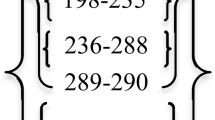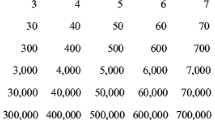Abstract
This is a commentary on the special issue articles on rituals and exploration in mathematics teaching and learning. It explores the question of whether and how we can learn from research on rituals and ritualization, when these are typically associated with poor or even no learning of mathematics. The papers in the special issue show there is indeed much to learn, and the commentary reflects on this learning together with the quandaries that arise from such engagement, in particular the quandaries of understanding and deficit discourses.
Similar content being viewed by others
References
Adler, J. (2001). Teaching mathematics in multilingual classrooms. Dordrecht: Kluwer Academic Publishers.
Adler, J., & Pillay, V. (2017). Mathematics education in South Africa. In J. Adler & A. Sfard (Eds.), Research for educational change: Transforming researchers’ insights into improvement in mathematics teaching and learning (pp. 9–24). Abingdon: Routledge.
Adler, J., & Ronda, E. (2015). A framework for describing mathematics discourse in instruction and interpreting differences in teaching. African Journal of Research in Mathematics, Science and Technology Education, 19(3), 237–254.https://doi.org/10.1080/10288457.2015.1089677.
Adler, J., & Ronda, E. (2017). A lesson to learn from: From research insights to teaching a lesson. In J. Adler & A. Sfard (Eds.), Research for educational change: Transforming researchers’ insights into improvement in mathematics teaching and learning (pp. 133–143). Abingdon: Routledge.
Barnes, D. (2010). Why talk is important. English Teaching: Practice and Critique, 9(2), 7–10.
Barwell, R. (2018). Repertoires of three second language learners of mathematics: Distal and situational sources of meaning. Research in Mathematics Educ ation, 1–17. https://doi.org/10.1080/14794802.2018.1490664
Coles, A., & Sinclair, N. (2018). Ritualisation in early number work. Educational Studies in Mathematics. https://doi.org/10.1007/s10649-018-9815-6.
Heyd-Metzuyanim, E., Smith, M., Bill, V., & Resnick, L. B. (2018). From ritual to explorative participation in discourse-rich instructional practices: A case study of teacher learning through professional development. Educational Studies in Mathematics. https://doi.org/10.1007/s10649-018-9849-9.
Hiebert, J. (1986). Conceptual and procedural knowledge: The case of mathematics. Hillsdale, NJ: Lawrence Erlbaum Associates.
Hiebert, J., Stigler, J. W., Jacobs, J. K., Givvin, K. B., Garnier, H., Smith, M., & Gallimore, R. (2005). Mathematics teaching in the United States today (and tomorrow): Results from the TIMSS 1999 video study. Educational Evaluation and Policy Analysis, 27(2), 111–132.
Janks, H. (2010). Literacy and power. New York: Routledge.
Kieran, C. (2013). The false dichotomy in mathematics education between conceptual understanding and procedural skills: An example from algebra. In K. Leatham (Ed.), Vital directions for mathematics education research (pp. 153–171). Dordrecht: Springer.
Lattimer, H. (2015). Translating theory into practice: Making meaning of learner centered education frameworks for classroom-based practitioners. International Journal of Educational Development, 45, 65–76.
Lavie, I., Steiner, A., & Sfard, A. (2018). Routines we live by: From ritual to exploration. Educational Studies in Mathematics. https://doi.org/10.1007/s10649-018-9817-4.
Marton, F., & Tsui, A. B. M. (2004). Classroom discourse and the space of learning. New Jersey: Lawrence Erlbaum Associates.
McCloskey, A., Lloyd, G., & Lynch, C. (2017). Theorizing mathematics instruction using ritual: Tensions in teaching fractions in a fifth-grade classroom. Educational Studies in Mathematics. https://doi.org/10.1007/s10649-017-9779-y.
Nachlieli, T., & Tabach, M. (2018). Ritual-enabling opportunities-to-learn in mathematics classrooms. Educational Studies in Mathematics. https://doi.org/10.1007/s10649-018-9848-x.
Planas, N. (2014). On the process of gaining language as a resource in mathematics education. ZDM, 46(6), 883–893.
Robertson, S. A., & Graven, M. (2018). Exploratory mathematics talk in a second language: A sociolinguistic perspective. Educational Studies in Mathematics. https://doi.org/10.1007/s10649-018-9840-5.
Schweisfurth, M. (2013). Learner-centred education in international perspective: Whose pedagogy for whose development? London: Routledge.
Setati, M. (2005). Teaching mathematics in a primary multilingual classroom. Journal for Research in Mathematics Education, 36(5), 447–466.
Setati, M., & Adler, J. (2001). Between languages and discourses: Code-switching practices in primary mathematics classrooms in South Africa. Educational Studies in Mathematics, 43, 243–269.
Setati Phakeng, M. (2012). Mathematics in multilingual classrooms in South Africa: From understanding the problem to exploring possible solutions. In B. Herbel-Eisenmann, J. Choppin, & D. Wagner (Eds.), Equity in discourse for mathematics education: Theories, practices and policies (pp. 125–145). Switzerland: Springer.
Sfard, A. (2008). Thinking as communicating human development, the growth of discourses, and mathematizing. New York: Cambridge University Press.
Sfard, A., & Lavie, I. (2005). Why cannot children see as the same what grown-ups cannot see as different?: Early numerical thinking revisited. Cognition and Instruction, 23(2), 237–309.
Skemp, R. R. (1987). Relational understanding and instrumental understanding. Mathematics teaching in the middle school (MTMS)., 77, 20–26.
Star, J. (2005). Reconceptualising procedural knowledge. Journal for Research in Mathematics Education, 36(5), 404–411.
Viirman, O., & Nardi, E. (2018). Negotiating different disciplinary discourses: Biology students’ ritualized and exploratory participation in Mathematical Modelling activities. Educational Studies in Mathematics. https://doi.org/10.1007/s10649-018-9861-0.
Watson, A. (Ed.) (2018). Variation in mathematics teaching and learning. Derby: Association of Teachers of Mathematics.
Watson, A., & Mason, J. (2006). Seeing an exercise as a single mathematical object: Using variation to structure sense-making. Mathematical Thinking and Learning, 8(2), 91–111.
Funding
This work is based on research supported by the South African Research Chairs Initiative of the Department of Science and Technology and National Research Foundation (Grant No. 71218).
Author information
Authors and Affiliations
Corresponding author
Ethics declarations
Disclaimer
Any opinion, finding and conclusion or recommendation expressed in this material is that of the author(s) and the NRF does not accept any liability in this regard.
Additional information
Publisher’s note
Springer Nature remains neutral with regard to jurisdictional claims in published maps and institutional affiliations.
Rights and permissions
About this article
Cite this article
Adler, J. Learning about mathematics teaching and learning from studying rituals and ritualization? A commentary. Educ Stud Math 101, 291–299 (2019). https://doi.org/10.1007/s10649-018-9876-6
Published:
Issue Date:
DOI: https://doi.org/10.1007/s10649-018-9876-6




